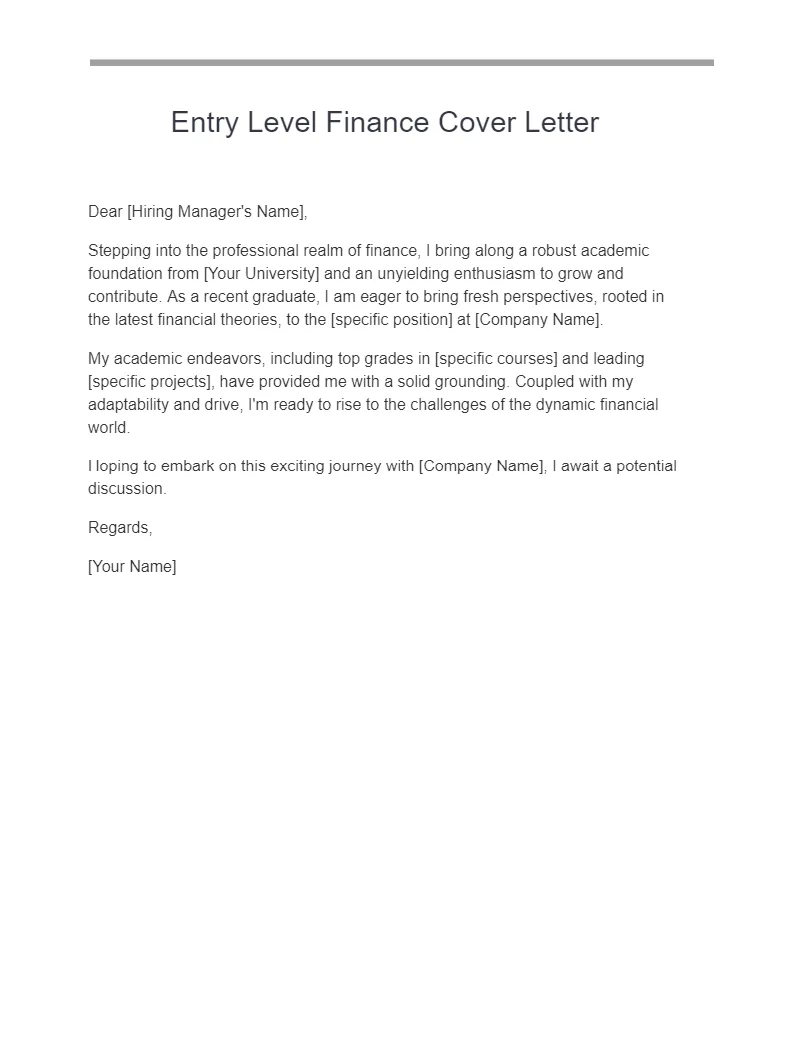Understanding the Importance of a Finance Cover Letter
In the competitive world of finance, a well-crafted cover letter is often your first point of contact with a potential employer. It’s your chance to make a strong first impression and differentiate yourself from other candidates. A finance cover letter is not just a formality, it’s a vital tool that can significantly boost your chances of landing an interview. It allows you to expand on your resume, highlighting your skills, experience, and passion for the finance industry. A compelling cover letter demonstrates your communication skills and shows that you’ve taken the time to research the company and the specific role you’re applying for. Ignoring this crucial document is a missed opportunity that could cost you a promising career path.
Why a Cover Letter is Crucial
A cover letter is crucial for several reasons. Firstly, it provides context to your resume. Resumes often list skills and experience, but the cover letter allows you to explain how those skills and experiences align with the specific job requirements and the company’s values. Secondly, it showcases your personality and writing abilities. Finance is a field that demands clear, concise communication, and your cover letter provides an example of your written communication skills. Thirdly, a cover letter allows you to express your enthusiasm for the role and the company, which can set you apart from candidates who may simply submit a resume without a personalized message. A cover letter shows you are not just applying for any job; you are actively targeting this specific opportunity. It demonstrates your interest and dedication.
Highlighting Your Unique Value Proposition
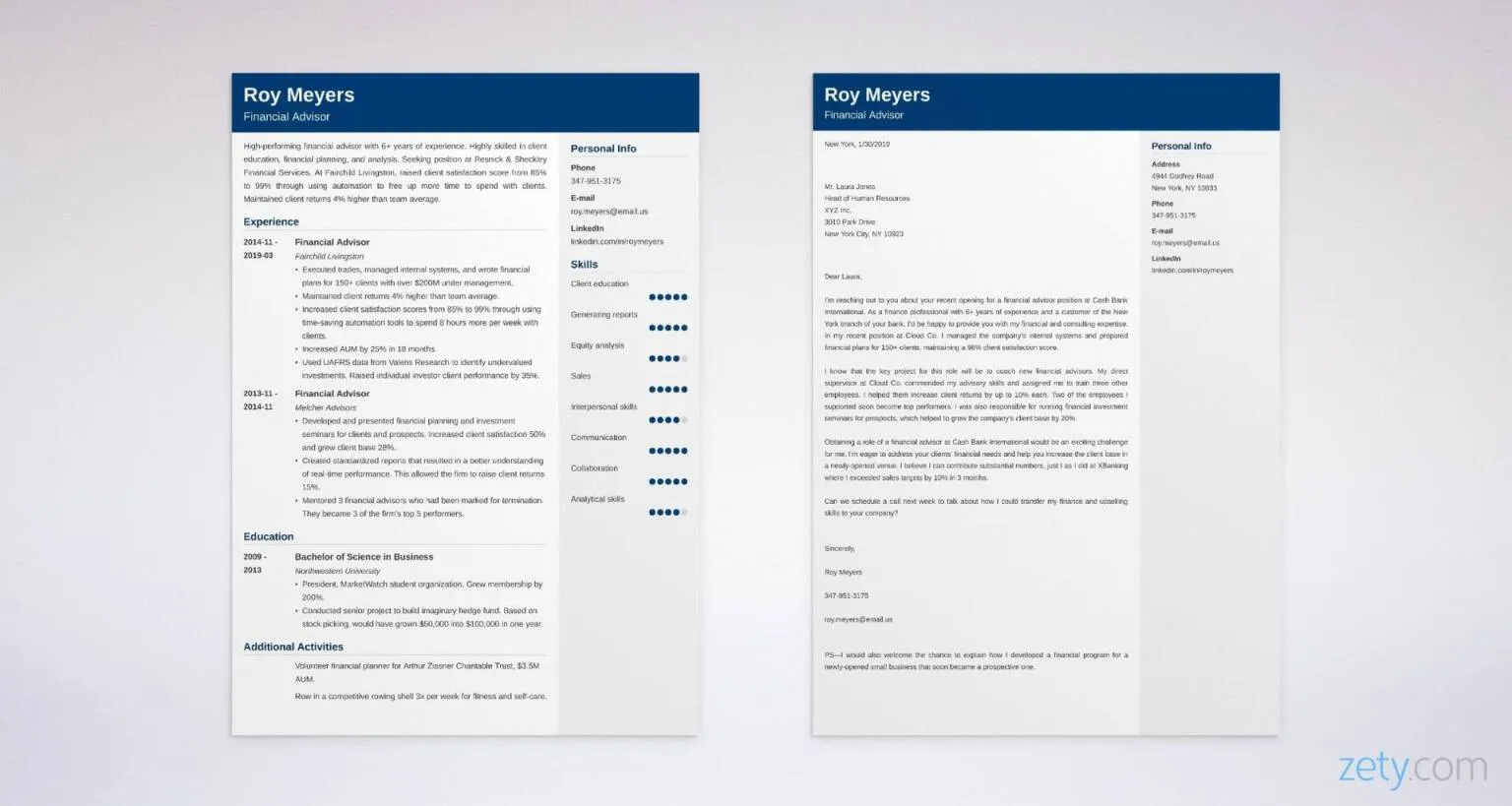
Your cover letter should clearly articulate your unique value proposition. What specific skills, experiences, or qualities do you bring to the table that make you the ideal candidate? This is where you can go beyond the basic requirements listed in the job description and showcase what differentiates you from the competition. Consider what problems you can solve for the company or what contributions you can make to their success. For example, if you have a proven track record of increasing profitability, managing budgets effectively, or streamlining financial processes, make sure to highlight these achievements. Tailor your value proposition to the specific needs of the role and the company, demonstrating how your skills align with their goals.
Key Components of a Finance Cover Letter
Contact Information and Date
Start your cover letter with your contact information including your name, address, phone number, and email address. Include the date below your contact information. If you’re applying through an online portal, ensure your contact information is consistent across all applications materials. Use a professional email address. Ensure your phone number is current and that your voicemail is set up professionally. This seems obvious, but many candidates miss this important first step, making it harder for the employer to reach you and potentially leading to a missed job opportunity. Make sure the date is properly formatted.
The Salutation
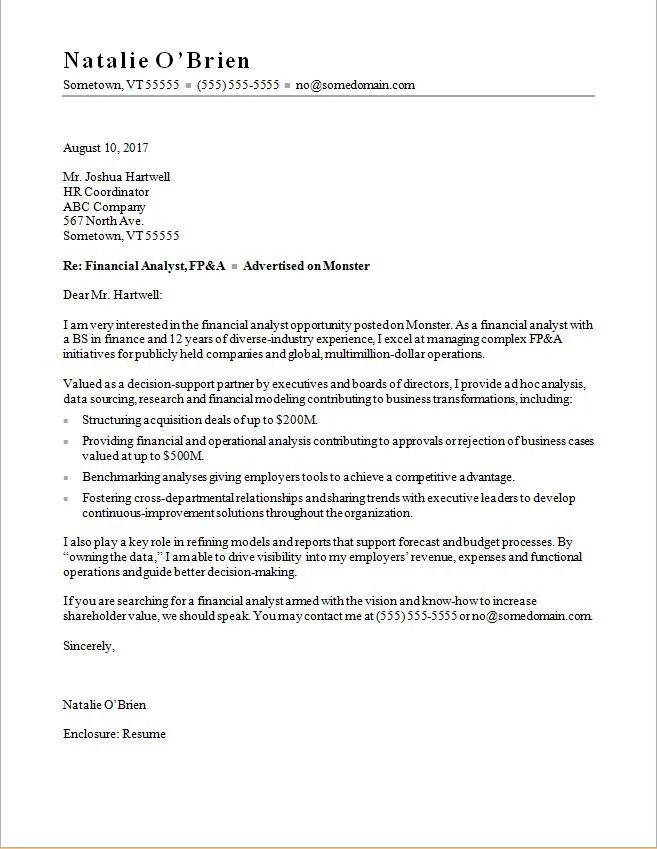
Address the hiring manager or the specific person who is responsible for hiring for the role, if possible. Researching the name of the hiring manager is a great way to show you care about the opportunity. If you cannot find a specific name, use a professional salutation such as “Dear Hiring Manager.” Avoid generic salutations such as “To Whom It May Concern,” as these can make your application feel impersonal. If the job posting provides a contact, definitely use their name. Always double-check the spelling of the name to avoid any embarrassing errors, which can leave a negative impression.
Opening Paragraph Grabbing Attention
The opening paragraph should immediately grab the reader’s attention and state the purpose of your letter. Clearly mention the specific position you are applying for and how you learned about it. Consider starting with a strong statement about why you are interested in the role or the company. You might mention a particular achievement, a relevant skill, or your passion for the finance industry. Avoid generic opening lines. The opening paragraph sets the tone for your entire cover letter, so make it concise, impactful, and designed to capture the reader’s interest from the very beginning. Think of it as your sales pitch.
Body Paragraphs Showcasing Skills and Experience
The body paragraphs are the heart of your cover letter. This is where you provide details about your skills, experience, and accomplishments that are relevant to the job. Use specific examples to illustrate your capabilities and achievements. Focus on the requirements outlined in the job description and highlight how your skills and experience align with them. Quantify your achievements whenever possible, using numbers and data to demonstrate the impact you’ve made in previous roles. Show, don’t just tell. Use action verbs to describe your responsibilities and accomplishments. Tailor each body paragraph to focus on a specific skill or experience that is particularly relevant to the job requirements.
Quantifying Achievements
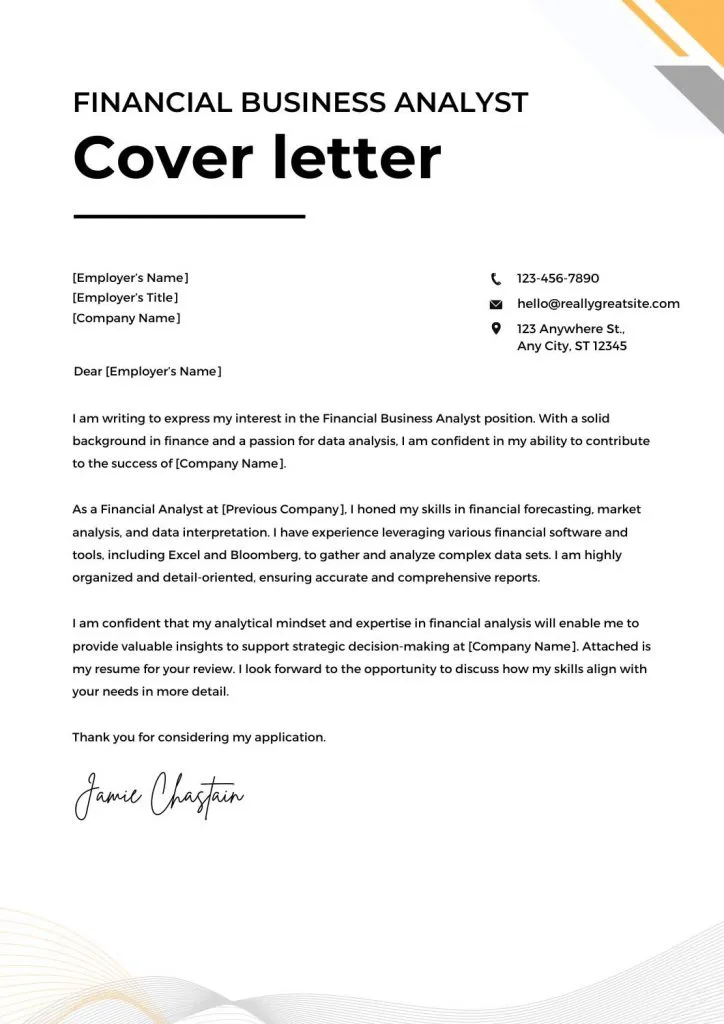
In finance, quantifying your achievements is crucial. Use numbers and data to demonstrate the impact of your work. For example, instead of saying “Improved financial reporting,” say “Improved financial reporting accuracy by 15% resulting in a $100,000 reduction in discrepancies.” Instead of saying you managed a budget, state the amount of the budget. Including quantifiable metrics will not only show you can do the job, but also make it a lot easier for the employer to see how you could benefit their organization. Highlighting these accomplishments makes you stand out from the competition and provides concrete evidence of your ability to deliver results. Make sure the numbers are accurate.
Tailoring Your Cover Letter
Each cover letter should be tailored to the specific job and company. Avoid using a generic cover letter for every application. Research the company and the role to understand the specific requirements and expectations. Customize your cover letter to address these points. Mention specific projects or initiatives that the company is working on, and explain how your skills and experience can contribute to their success. Tailoring your letter shows that you are genuinely interested in the role and that you have taken the time to understand the company’s needs. This personalization greatly increases your chances of getting noticed and securing an interview.
Closing Paragraph and Call to Action
The closing paragraph should reiterate your interest in the position and thank the reader for their time and consideration. Express your enthusiasm for the opportunity and briefly restate why you are a good fit for the role. Include a call to action, such as “I am eager to discuss my qualifications further in an interview” or “I look forward to hearing from you soon.” End with a professional closing such as “Sincerely” or “Best regards,” followed by your name. Review your cover letter one last time to make sure it flows well and leaves the reader with a positive impression.
Formatting and Presentation
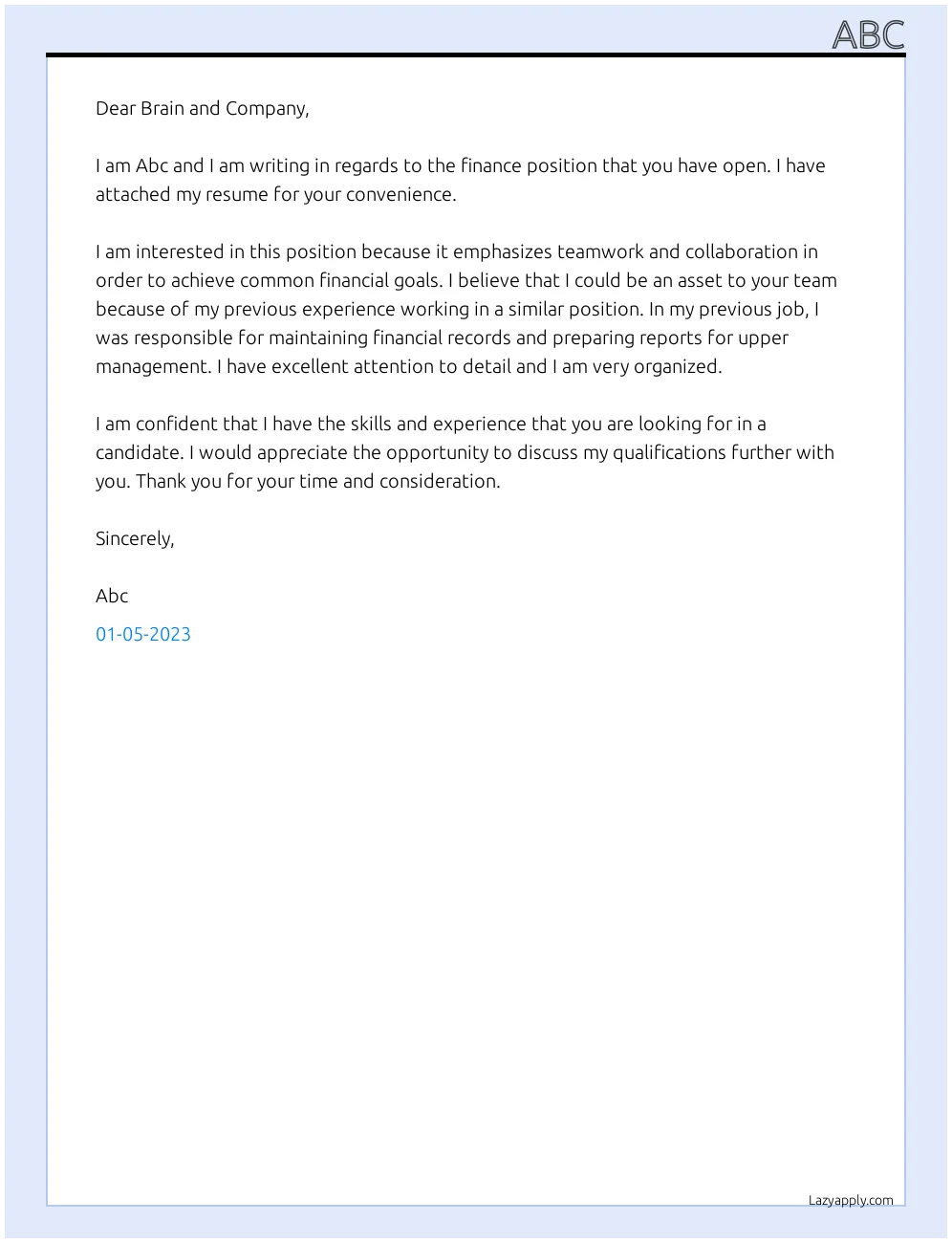
Choosing the Right Font and Layout
The formatting of your cover letter is almost as important as the content. Choose a clean, professional font such as Times New Roman, Arial, or Calibri. Use a font size between 10 and 12 points for readability. Maintain a consistent font throughout the document. Use a standard business letter format with one-inch margins on all sides. Ensure your cover letter is easy to read and visually appealing. Use ample white space to avoid a cluttered look. Break up large blocks of text into smaller paragraphs to enhance readability. Use bullet points to highlight key skills or achievements. A well-formatted cover letter reflects your attention to detail and professionalism.
Proofreading and Editing
Proofreading and editing your cover letter is critical. Typos, grammatical errors, and inconsistencies can make you appear unprofessional and can cause you to lose out on an opportunity. Read through your cover letter multiple times, and ideally, have someone else review it as well. Check for spelling errors, grammatical mistakes, punctuation issues, and inconsistencies in formatting. Ensure that your sentences are clear, concise, and well-structured. Pay close attention to detail. Proofread your cover letter meticulously before submitting it. This final check is a key step to ensure the document represents your best work.
Cover Letter Examples for Finance Professionals
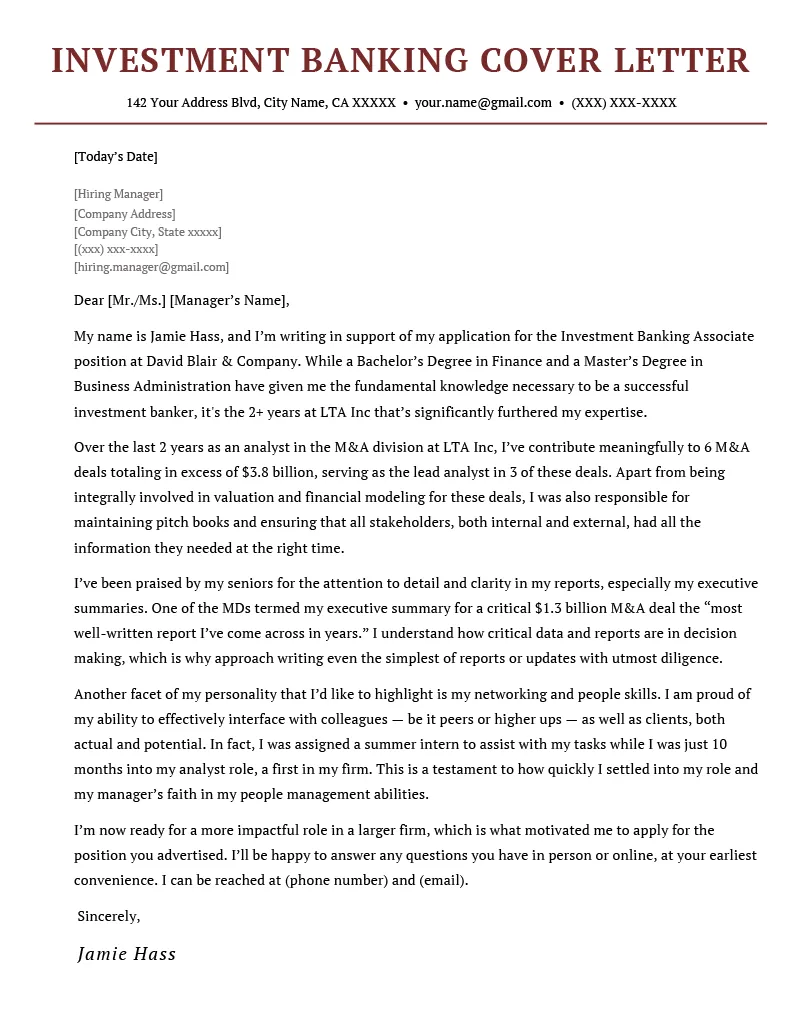
Entry-Level Finance Cover Letter Example
An entry-level finance cover letter should highlight relevant coursework, internships, and any financial analysis or modeling skills you’ve gained. Emphasize your eagerness to learn and contribute to the team. If you have experience with financial software, mention it. Focus on your education and any relevant projects or volunteer work you’ve done. Example: “As a recent graduate with a degree in Finance and a strong academic record, I am eager to apply my skills to a challenging role. During my internship at [Company Name], I gained experience in financial analysis, which I believe makes me a strong candidate.”
Mid-Level Finance Cover Letter Example
A mid-level cover letter should demonstrate your experience and achievements. Quantify your accomplishments whenever possible. Highlight any leadership experience and your ability to manage projects. Focus on your contributions to your previous companies. Show how you have advanced your career and grown in your previous roles. Example: “In my role as a Financial Analyst at [Company Name], I successfully managed a budget of $X, resulting in a Y% reduction in costs. I am experienced in developing financial models and providing strategic recommendations.” Emphasize your ability to work independently and take on new responsibilities.
Senior-Level Finance Cover Letter Example
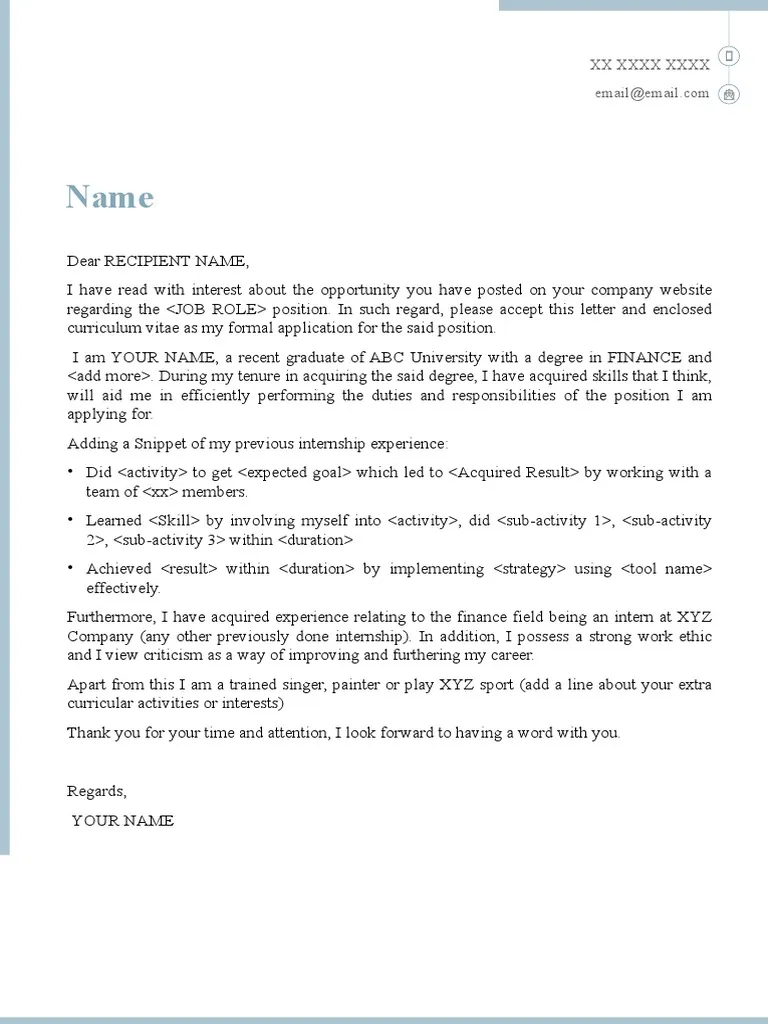
A senior-level finance cover letter should showcase your leadership skills, strategic thinking, and significant achievements. Focus on your ability to drive results and contribute to the company’s financial success. Demonstrate your expertise in financial management, strategic planning, and risk management. Highlight your ability to lead teams and manage complex projects. Example: “As a CFO at [Company Name], I led the financial strategy that resulted in a 20% increase in revenue and improved profitability. I have a proven track record of building high-performing teams and navigating complex financial challenges.” Emphasize the breadth and depth of your experience.
Common Mistakes to Avoid
Generic Cover Letters
Avoid using a generic cover letter that is not tailored to the specific job or company. Generic cover letters can make you seem uninterested and can indicate that you’re not taking the time to understand the company’s needs. Tailor each cover letter to the specific job description, highlighting the skills and experiences that are most relevant to the role. Research the company and its values. Demonstrate that you’ve done your homework and that you are genuinely interested in the opportunity. This will help your cover letter stand out from the stack.
Typos and Grammatical Errors
Typos and grammatical errors are a major turnoff. They can make you appear unprofessional and can damage your credibility. Always proofread your cover letter carefully before submitting it. Use a grammar and spell checker, but also read through the letter yourself to catch any errors that the software might miss. Consider having a friend or colleague review your cover letter as well. Pay attention to detail and ensure that your writing is clear, concise, and error-free. A polished cover letter demonstrates your attention to detail and your commitment to excellence.
Focusing Only on Job Duties
Avoid simply listing your job duties from previous roles. Your cover letter should highlight your accomplishments and the impact you’ve made in your previous positions. Demonstrate how you have gone above and beyond your assigned duties. Quantify your achievements whenever possible, using numbers and data to illustrate the impact of your work. Showcase your skills, experience, and enthusiasm for the finance industry. Provide specific examples and demonstrate your ability to deliver results. This approach will make your cover letter more engaging and more impactful. Show, don’t just tell.
Final Thoughts and Next Steps
Writing a great finance cover letter takes time and effort, but it is an investment that can pay off handsomely. By following these guidelines, you can create a cover letter that effectively showcases your skills, experience, and passion for finance. Remember to tailor your cover letter to each job, quantify your achievements, and proofread carefully. Make sure to emphasize your unique value proposition and what you bring to the table. With a well-crafted cover letter, you’ll be well on your way to landing your dream finance job.
